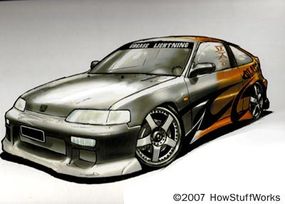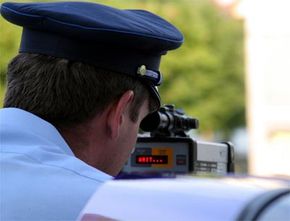Avoiding Tickets
We've talked about traffic stops, contesting tickets, points and traffic school, but of course, it's possible to forgo all of that trouble by avoiding tickets all together. In this section, we'll go over some tips that can help you to be a better driver and to avoid traffic tickets.
First, it's important to be acquainted with traffic law. Consult your state DMV's Web site for information on laws in your area. Once you are familiar with the rules of the road, make sure you stay alert while driving and respect all of the traffic laws. Even if you are at an empty intersection at 2:00 a.m., it's important to obey the traffic laws for your own safety and the safety of others. You never know when another driver -- or a police officer -- may suddenly come speeding through the intersection.
Advertisement
It's important to keep up with traffic around you, but remember that many states have an "absolute speed limit," meaning that you can be pulled over for going even one mile per hour over the speed limit!
Stay out of the left lane -- more people get pulled over from that lane, and it should be used primarily for passing.
Keep your mirrors and windows clean, and make sure nothing is obstructing your view.
Look out for highway patrol cars, which are often lurking around bends in freeways or in other concealed spots. If you see a highway patrol officer exit the freeway, don't consider that a license to speed. Highway patrol officers sometime exit a freeway only to come back on via another onramp a few minutes later.
If you see a highway patrol officer giving someone a ticket on or driving on the opposite side, that doesn't mean you're safe from being pulled over for speeding. Highway patrol officers are very skilled drivers, using powerful cars, and they can and will catch up to you if they see you speeding or driving recklessly. Law enforcement agencies also employ aircraft, motorcycles and radar stations to detect speeders, so you never know when you're being tracked.
Avoid any other way you can attract attention to yourself:

- Bumper stickers - it's certainly your right to have them, but they may attract unnecessary attention and possibly produce a bias in an officer who disapproves of the sticker's message
- Excessive window tint - certain levels of tint are illegal in some states
- Vanity plates
- Radar detectors - if an officer sees you have one, he or she will be less inclined to let you off
- Poorly maintained vehicle, including worn tires and missing hubcaps
- Vehicle modifications - extra lights and antennas, illegal muffler, lowered or dropped suspension
For more information on traffic tickets and related topics, check out the links below.
Related HowStuffWorks Articles
- How Traffic Works
- How DUI Works
- How Road Rage Works
- How Red Light Cameras Work
- How Radar Detectors Work
- How Brakes Work
- How Airbags Work
- How does a laser speed gun work to measure a car's speed?
- How does a traffic light detect that a car has pulled up and is waiting for the light to change?
- Why are they replacing all the traffic lights in my town?
More Great Links
Sources
- "License Suspensions and Revocations." Georgia Department of Driver Services. http://www.dds.ga.gov/drivers/DLdata.aspx? con=1744060376&ty=dl
- "Traffic Tickets, Traffic Violations, Traffic Law." FindLaw. http://public.findlaw.com/traffic-ticket-violation-law/traffic-ticket-overview/
- "Traffic Tickets - Resource Center." Nolo. http://www.nolo.com/resource.cfm/catID/CF015A63-6B69-4EED- A34B6F4035C8BE0E/104/263/
- "Fight Your Own Ticket." National Motorists Association. http://www.motorists.com/issues/tickets/ticket_fighting_info_strategies.html
- "Traffic Information." California Courts: Self Help Center. 12/29/06. http://www.courtinfo.ca.gov/selfhelp/traffic/info.htm#3kinds
